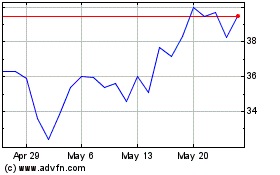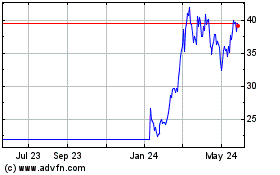Bitcoin rises 5% after Jerome Powell’s speech at Jackson Hole
Jerome Powell, Fed Chairman, delivered a speech at Jackson Hole
that boosted Bitcoin, gold, and stocks. Bitcoin (COIN:BTCUSD)
surged 4.9% to $63,360 at the time of writing, while the S&P
500, Nasdaq, and Dow Jones gained 0.89%, 1.21%, and 0.86%,
respectively. The revision of U.S. employment data, revealing
818,000 fewer jobs than reported, pressures the Fed to cut rates,
possibly in September.
Sony launches Soneium blockchain to boost Web3 innovation
Sony Group (NYSE:SONY) announced the launch of its blockchain,
Soneium, to accelerate Web3 innovation. Developed by Sony Block
Solutions Labs (SBL), a joint venture between Sony Group and
Startale Labs, Soneium will be built on Ethereum (COIN:ETHUSD) with
a new layer 2 network using Optimism’s (COIN:OPUSD) OP Stack
technology. The goal is to simplify Web3 experiences, offering
applications in gaming, finance, and entertainment, and expand
Web3’s reach to new audiences through Sony’s vast network.
JPMorgan cuts Bitcoin miners’ price targets
JPMorgan (NYSE:JPM) assessed the value of the remaining 1.3
million Bitcoins to be mined at about $74 billion. In response to
changes in Bitcoin’s price and hash rate, the bank revised price
targets for miners such as CleanSpark (NASDAQ:CLSK) from $12.50 to
$10.50 and Marathon Digital (NASDAQ:MARA) from $14 to $12. Riot
Platforms (NASDAQ:RIOT) saw its target cut from $12 to $9.50, and
Iris Energy (NASDAQ:IREN) from $11 to $9.50. However, JPMorgan sees
buying opportunities in Iren and Riot Platforms, highlighting
recovery potential due to improved operations.
Bitcoin ETFs maintain positive inflows with $64.8 million in gains
Bitcoin ETFs recorded their sixth consecutive day of inflows on
August 22, totaling $64.8 million. BlackRock’s ETF (NASDAQ:IBIT)
led with $75.5 million, reaching $20.6 billion in net inflows.
Other ETFs also attracted significant capital, ranging from $3.4
million to $9.2 million. On the contrary, Grayscale (AMEX:GBTC) and
Bitwise (AMEX:BITB) ETFs saw outflows of $28.4 million and $11.5
million, respectively.
Ethereum ETFs continued to face net outflows, with a total loss
of $0.8 million on Thursday. Grayscale (AMEX:ETHE) led the decline
with a $19.8 million outflow, while Fidelity (AMEX:FETH) partially
offset the losses with a $14.3 million inflow. Cumulative outflows
for Ethereum ETFs now total $459.3 million, highlighting the
difference in investor sentiment compared to Bitcoin ETFs.
Solana experiences sharp decline in user activity and transactions
In August, the Solana network saw a significant drop in demand,
reaching the lowest number of transactions and active addresses of
the year. Active user count fell 67% from July, drastically
impacting the network’s fees and revenue, which plummeted by over
50%. Despite the launch of new platforms like Pump.fun, overall
interest in Solana has waned, negatively affecting its financial
ecosystem. The SOL (COIN:SOLUSD) token price is down -13.60%
monthly.
MakerDAO launches NewGovToken to boost governance participation
MakerDAO, a cryptocurrency lending platform and creator of the
DAI stablecoin (COIN:DAIUSD), introduced NewGovToken (NGT) to
enhance governance participation. MKR (COIN:MKRUSD) holders can
convert each token for 24,000 NGT, offering a larger number of
voting tokens. With MKR currently trading at $2,138 and a limited
supply, the conversion aims to increase user engagement.
Additionally, MakerDAO announced NewStable (NST), a stablecoin
pegged to DAI, as part of its expansion plan.
Tether abandons plans for its own blockchain, citing market
saturation and strategy
Tether, the issuer of the USDT stablecoin (COIN:USDTUSD),
decided not to launch its blockchain due to market saturation and
the presence of established blockchains. CEO Paolo Ardoino told
Bloomberg News that with several effective blockchains available,
Tether prefers to remain “agnostic” to technology, using existing
blockchains to ensure USDT’s security and sustainability. The
company will continue to focus on expanding its stablecoin on
established platforms.
Justin Sun faces backlash after removing BTC from USDD reserve
without DAO approval
Justin Sun, founder of Tron (COIN:TRXUSD), is facing criticism
for withdrawing $700 million in Bitcoin from the USDD
(COIN:USDDUST) reserves without the Tron DAO Reserve’s consent,
raising concerns about the stablecoin’s centralization. Sun
defended the action, stating that USDD’s mechanism allows this
withdrawal if the reserve exceeds a certain value. However, the
community questions the lack of transparency and compliance with
the stablecoin’s stated principles.
Fetch.ai opens innovation hub in San Francisco to advance AI
technology
Fetch.ai (COIN:FETUSD) is launching the Innovation Lab in San
Francisco to promote AI technology. The hub will support
early-stage startups developing AI agents, allocating up to $10
million annually to fund promising projects, with a limit of $1
million per project. The goal is to bridge research and market,
supporting initiatives that integrate AI agent technology,
potentially revolutionizing industries. Fetch.ai also introduced
internship and ambassador programs to strengthen the AI
community.
AMOS malware threatens Mac users by cloning crypto wallet apps
The “Atomic macOS” (AMOS) malware has returned with new
capabilities to clone wallet apps like Ledger Live, stealing
cryptocurrencies from users. Detected by Moonlock Lab, AMOS is
being distributed disguised as popular programs in Google AdSense
ads. The technique allows the malware to replace legitimate apps
with malicious versions, deceiving users and compromising their
crypto wallets.
WazirX resumes fiat withdrawals after cyberattack
WazirX, an Indian cryptocurrency exchange, will resume fiat
withdrawals on August 26 after a hack that suspended operations for
a month. The plan will allow withdrawals of up to 66% of balances
in Indian Rupees (INR) in phases, while the exchange seeks to
legally restructure its crypto deficit. Police investigations still
keep 34% of funds frozen.
China extradites leader of $14 billion crypto pyramid scheme from
Thailand
The Chinese government announced the extradition of Zhang, the
mastermind behind a $14 billion crypto pyramid scheme, from
Thailand. Zhang, who led the MBI Group, attracted investors since
2012 with promises of high returns. The scheme involved over 10
million people. After a four-year investigation, Zhang was arrested
in Thailand in 2022 and extradited in August 2023, marking a joint
effort between China and Thailand.
DMM Group partners with Progmat to launch stablecoin integrated
with Seamoon Protocol
DMM Group, in partnership with Progmat, is developing a
stablecoin under Japanese regulations. Integrated with the Seamoon
Protocol, the stablecoin aims to stabilize the network’s SMP token
and strengthen the treasury fund. The launch will occur in three
phases, starting with SMP stabilization, followed by usage in the
DMM ecosystem, and finally offering an alternative to credit card
payments.
El Salvador continues to accumulate Bitcoin with daily purchases
El Salvador, the first country to adopt Bitcoin as legal tender,
has been aggressively accumulating the cryptocurrency, purchasing
one Bitcoin daily since March 16. As a result, the country has
increased its reserves by 162 BTC, totaling 5,851 BTC, valued at
approximately $356.4 million. President Nayib Bukele, a strong
advocate of Bitcoin (COIN:BTCUSD), uses this strategy to integrate
the cryptocurrency into the national economy, promoting economic
independence and financial innovation.
Kraken criticizes regulatory clarity after court ruling in
Australia
Kraken blamed the lack of regulatory clarity in Australia after
losing a court case involving its local operator, Bit Trade Pty
Ltd. The federal court ruled that Bit Trade failed to comply with
Section 994B of the Corporations Act, which requires a “target
market determination” before launching financial products. Kraken
agreed to comply with the ruling but emphasized the urgent need for
clear cryptocurrency regulations in the country.
Simplification of Web3 wallets is essential for mass adoption, CASA
expert argues
The complexity of Web3 wallets, especially the use of seed
phrases, is one of the biggest barriers to mass cryptocurrency
adoption. Bumblefudge, from the Chain Agnostic Standards Alliance
(CASA), highlighted at the Web3 Summit 2024 that to attract
mainstream users, the industry needs collaborative standards that
eliminate these barriers. The lack of interoperability and
usability hinders the integration of new users. He argues that the
focus should be on creating simpler and more accessible solutions
aligned with user expectations to drive global adoption.
Impact of CBDCs on financial well-being questioned
Although central bank digital currencies (CBDCs) are promoted as
tools for financial inclusion, recent studies indicate that where
they have been adopted, well-being has decreased. Studies from 2019
to 2023 indicate that where CBDCs have been implemented, financial
well-being has declined, particularly among young people and
low-income individuals. These groups reported greater financial
insecurity, contradicting the narrative that CBDCs are beneficial.
The lack of significant economic growth and potential risks of
financial instability may be contributing to these negative
effects.
iShares Bitcoin Trust ETF (NASDAQ:IBIT)
Historical Stock Chart
From Oct 2024 to Nov 2024

iShares Bitcoin Trust ETF (NASDAQ:IBIT)
Historical Stock Chart
From Nov 2023 to Nov 2024
